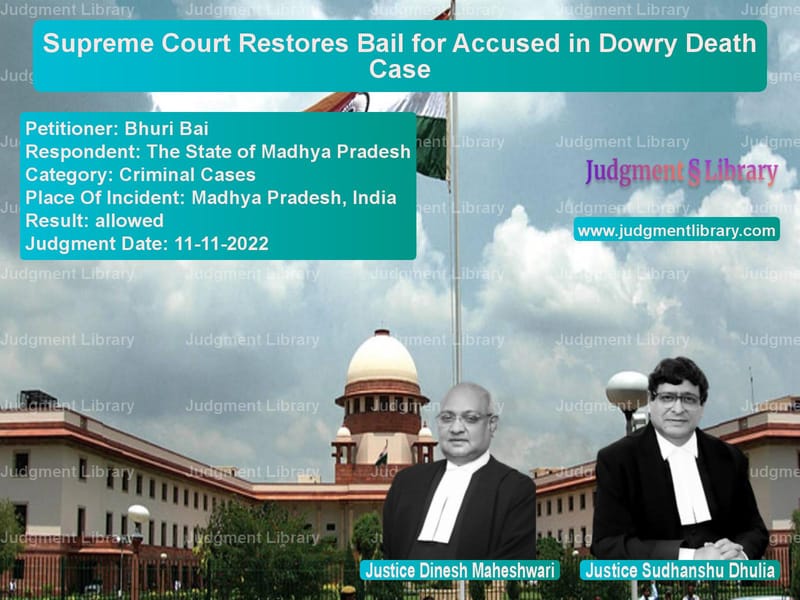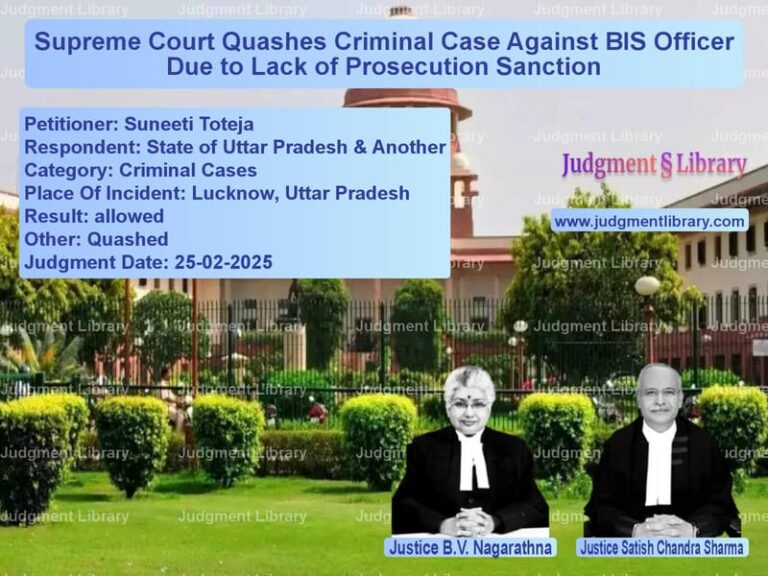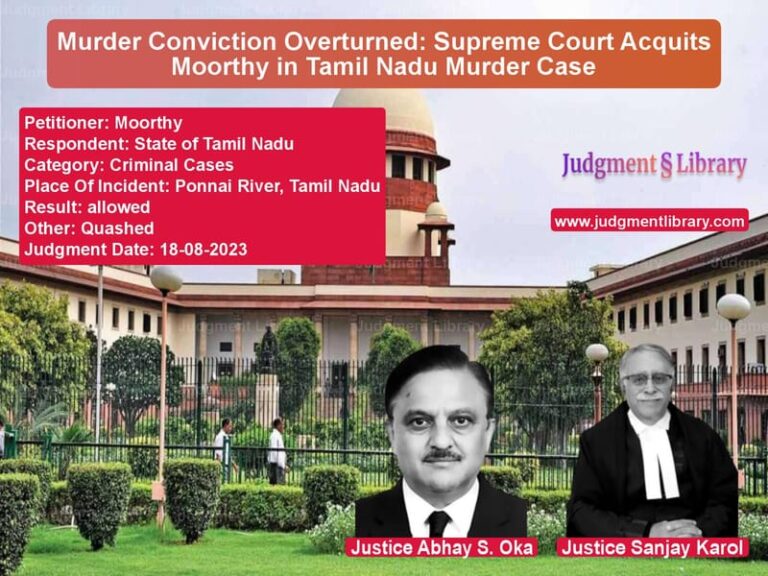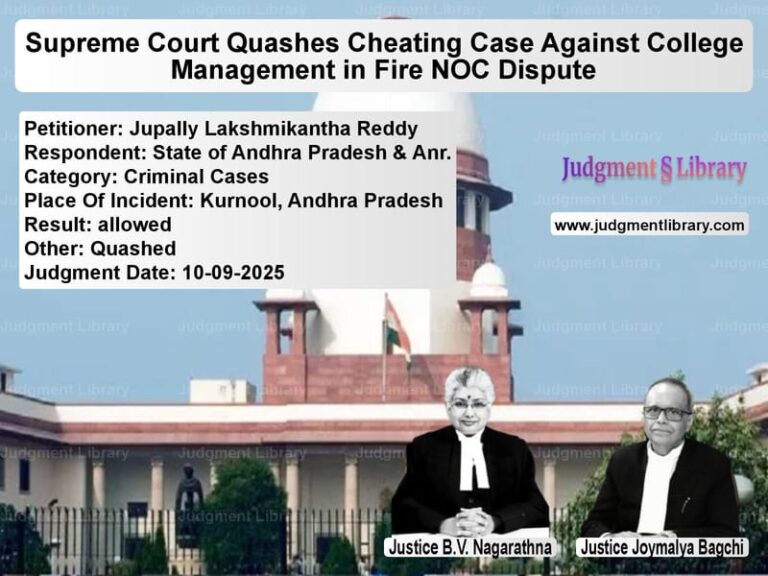Supreme Court Restores Bail for Accused in Dowry Death Case
The Supreme Court of India recently ruled in the case of Bhuri Bai v. The State of Madhya Pradesh, a case that addressed the cancellation of bail and its impact on a criminal appeal. The appellant, Bhuri Bai, had been granted bail by the First Additional Sessions Judge in 2021 in connection with charges under Sections 304B, 498A of the Indian Penal Code (IPC), and Section 3/4 of the Dowry Prohibition Act. The High Court had later canceled her bail, which was challenged by her before the Supreme Court.
Background of the Case
The appellant, Bhuri Bai, was charged in connection with the dowry death of her daughter-in-law, who allegedly committed suicide due to torture over dowry demands. The FIR was registered against the appellant and several other family members under the relevant provisions of the IPC and the Dowry Prohibition Act. Initially, the appellant’s application for pre-arrest bail was rejected, but later the First Additional Sessions Judge granted her regular bail in August 2021. This decision was challenged by the prosecution, leading to the High Court exercising its suo motu powers to cancel the bail order, as detailed in M.Cr.C. No. 46653/2021, dated 10.02.2022.
Read also: https://judgmentlibrary.com/supreme-court-acquits-protestors-in-kerala-public-property-damage-case/
Legal Issues Before the Court
The key issues before the Supreme Court were:
- Whether the High Court had exercised its powers of cancellation of bail correctly, especially given the facts of the case and the appellant’s socio-economic background.
- Whether the appellant’s delayed surrender and the subsequent grant of bail were valid under the law.
- Whether the High Court’s decision to cancel bail was justified in light of the nature of the allegations and the appellant’s age and health.
Petitioner’s Arguments
The appellant’s counsel argued that:
- The appellant was not an absconder, as suggested by the High Court. She had attempted to file for bail twice before surrendering, but due to family circumstances, including looking after a minor child and the COVID-19 pandemic, she could not do so earlier.
- The High Court did not consider the fact that the appellant had been granted bail by the Sessions Court after taking into account the fact that her co-accused had also been granted bail.
- At the time of her surrender, her husband had been granted bail, and the appellant had no reason to evade the law.
- The trial court had already granted her bail considering her age (55 years) and the fact that she was not a flight risk.
Respondent’s Arguments
The State of Madhya Pradesh argued that:
- The appellant was absent from the legal process for a considerable period, as she had surrendered only after her husband had been granted bail, which indicated an attempt to avoid legal proceedings.
- The allegations against the appellant were serious, involving dowry harassment and the death of her daughter-in-law, which made her a potential threat to the investigation process if released on bail.
- The High Court’s decision to cancel the bail was justified given the appellant’s prolonged absence from the legal process, including her failure to appear before authorities when summoned.
Supreme Court’s Observations
The Supreme Court made the following key observations:
- The Court observed that the appellant’s delayed surrender could not be equated with abscondence. While it was an undesirable delay, there were factors such as family responsibilities and the COVID-19 pandemic that contributed to the appellant’s delay.
- It was noted that the appellant was a 55-year-old woman and had been granted bail by the Sessions Court, which considered her socio-economic status, her health, and the fact that other family members had been granted bail.
- The Court emphasized that cancellation of bail under Section 439(2) CrPC should be exercised sparingly and only when there are strong grounds for believing that the accused may misuse the liberty granted.
- There was no evidence of the appellant violating the conditions of her bail, nor was there evidence of her interfering with the trial process.
Supreme Court’s Verdict
The Supreme Court, after considering the arguments and observations, passed the following orders:
- “We find that the High Court’s order to cancel the bail was not justified in the present circumstances.”
- “The appellant is granted relief, and the bail granted by the Sessions Court is restored.”
- “The High Court’s order dated 10.02.2022 is set aside.”
The Court concluded by reiterating that bail is an essential right of an accused unless there are compelling reasons to deny it. The appellant was to remain out on bail with the conditions originally set by the Sessions Court.
Key Takeaways from the Judgment
- Importance of Bail: The judgment underscores the importance of upholding the right to bail, especially when the accused has not misused the liberty granted and has not violated the terms of bail.
- Proportionality in Bail Cancellation: The Court reiterated that bail cancellation under Section 439(2) CrPC should only be done with cogent and overwhelming evidence of misconduct or violation of bail conditions.
- Factors Affecting Bail: The case illustrates how the personal circumstances of the accused, such as age, health, and familial responsibilities, must be considered when granting or canceling bail.
- Delay in Surrender: The Court made it clear that a delayed surrender does not automatically equate to abscondence, especially when there are reasonable justifications such as family circumstances or health concerns.
Implications of the Judgment
The ruling has several implications for criminal law and bail proceedings:
- It highlights the Court’s approach to balancing the gravity of allegations with the rights of the accused.
- It sets a precedent for how delays in surrender should be viewed and stresses that not all delays should be seen as attempts to evade justice.
- It strengthens the principle that bail should not be cancelled lightly and that factors such as age, health, and family responsibilities should be given due consideration.
Conclusion
The Supreme Court’s decision in Bhuri Bai v. The State of Madhya Pradesh reinforces the importance of upholding an accused’s right to bail, especially when the accused has complied with the legal procedures and there is no evidence of misuse of liberty. By setting aside the High Court’s order, the Court has provided clarity on the application of bail laws and the standards for cancellation of bail in criminal cases.
Petitioner Name: Bhuri Bai.Respondent Name: The State of Madhya Pradesh.Judgment By: Justice Dinesh Maheshwari, Justice Sudhanshu Dhulia.Place Of Incident: Madhya Pradesh, India.Judgment Date: 11-11-2022.
Don’t miss out on the full details! Download the complete judgment in PDF format below and gain valuable insights instantly!
Download Judgment: bhuri-bai-vs-the-state-of-madhya-supreme-court-of-india-judgment-dated-11-11-2022.pdf
Directly Download Judgment: Directly download this Judgment
See all petitions in Bail and Anticipatory Bail
See all petitions in Custodial Deaths and Police Misconduct
See all petitions in Criminal Defamation
See all petitions in Judgment by Dinesh Maheshwari
See all petitions in Judgment by Sudhanshu Dhulia
See all petitions in allowed
See all petitions in supreme court of India judgments November 2022
See all petitions in 2022 judgments
See all posts in Criminal Cases Category
See all allowed petitions in Criminal Cases Category
See all Dismissed petitions in Criminal Cases Category
See all partially allowed petitions in Criminal Cases Category







